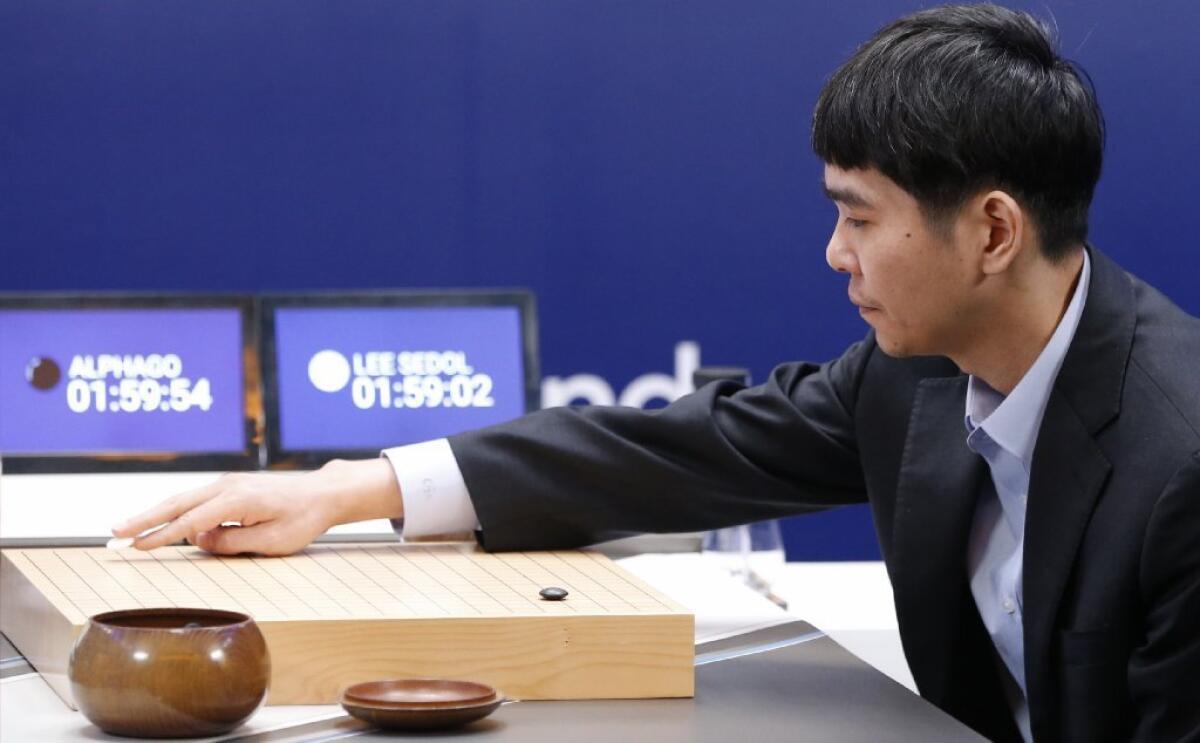How a human Go champion finally beat Google’s artificial intelligence machine

South Korean Go player Lee Sedol places the first stone against Google’s artificial intelligence program, AlphaGo. Sunday in Seoul.
- Share via
reporting from SEOUL — It took four tries, but the world’s top-ranked Go player finally scored a win over Google DeepMind’s AlphaGo on Sunday, putting a dent in the artificial intelligence program’s surprising dominance in the ancient East Asian board game.
Lee Sedol and AlphaGo have been facing off in a five-game match in Seoul. In a shock to most observers of Go, AlphaGo won the first three games rather handily, claiming the match and marking a milestone in the history of artificial intelligence. Until the development of AlphaGo, computer programs had been unable to master Go, which is far more complex than chess or checkers.
Despite AlphaGo’s strong performance in the first three games, Lee, 33, said on Sunday that he was able to identify and capitalize on weaknesses in the program to pull out his first win. In the earlier games, Lee had appeared exasperated at his inability to find any vulnerability. After the game on Sunday, he was all smiles, saying, “This one win is so valuable and I will not trade this for anything in the world,” according to the Associated Press.
On Twitter, Google DeepMind co-founder Demis Hassabis said after the game that Lee “was too good for us today and pressured #AlphaGo into a mistake that it couldn’t recover from.”
Lee explained that he turned the tide on Sunday by making an unconventional move that stumped AlphaGo. He says that his victory indicates that there is still room to improve the program.
This one win is so valuable and I will not trade this for anything in the world.
— Lee Sedol, Go champion
DeepMind designed neural networks and a state-of-the-art research program to allow AlphaGo to recognize and learn the best moves in a broad range of scenarios, thereby gaining unprecedented proficiency in the complex and intuitive game for an AI program.
Games of Go consist of two players using black and white stones on a grid, attempting to use the stones to gain control of territory. The game has simple rules, which allow for a practically endless range of moves, and Google DeepMind had to teach AlphaGo to identify the most effective responses to thousands of them.
With the series now 3-1 in favor of AlphaGo, the Google program has already claimed the $1 million in prize money, which the company says it will donate to charity. Under Go rules, all five games will still be played.
Lee will have Monday to rest before playing the fifth and final game on Tuesday afternoon.
ALSO
Chinese insurer acquiring Santa Monica resort, Hotel del Coronado
Snowmobile slams into Iditarod teams, killing one dog and injuring others
How black, Latino and Muslim college students organized to stop Trump’s rally in Chicago
More to Read
Sign up for Essential California
The most important California stories and recommendations in your inbox every morning.
You may occasionally receive promotional content from the Los Angeles Times.










